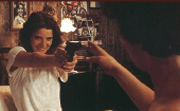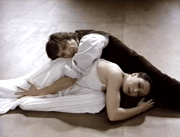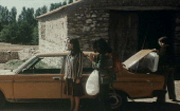Inasmuch as Hou Hsiao Hsien’s Goodbye South Goodbye, Nagisa Oshima’s Cruel Story of Youth, and Theo Angelopoulos’ The Beekeeper capture the rootlessness of a morally stunted, lost generation that has come of age at a time of profound political and cultural transformation, the reckless, thrill-seeking, young anti-heroes of Carlos Saura’s Deprisa, Deprisa also indirectly bear […]
Tag: Carlos Saura
Blood Wedding, 1981
In a sense, Carlos Saura’s first foray into filming classical dance, Blood Wedding, may be seen, not as a stark departure from the immediacy of his narrative films, but rather, as an oblique return to form towards the social interrogations implicit in his earlier work on the fundamental question of Spanish identity – a particularly […]
Mama Turns 100 Years Old, 1979
Returning to the dysfunctional family dynamic and generational saga of Anna and the Wolves in its psychological exposition into the root of ingrained human cruelty and repression, Mama Turns 100 Years Old is a wry, eccentric, and provocative, if underformed satire on the latent trauma and moral repercussions of emotional subjugation, manipulation, and corruption. On […]
Elisa, My Love, 1977
Marking Carlos Saura’s first film following the death of Franco in 1975 as Spain emerged from the shadows of fascism towards democracy, Elisa, My Love also represents Saura’s creative transition from allusively political to integrally personal filmmaking, resulting in one of his most intimate, captivating, emotionally lucid, and profoundly introspective works on loneliness, aging, passion, […]
Cría Cuervos, 1976
An inquisitive, cherubic girl named Ana (Ana Torrent) overhears a tender exchange between her father, a military officer named Anselmo (Héctor Alterio) and his mistress, Amelia (Mirta Miller), before the intimate moment gives way to tragedy and confusion, as Anselmo suffers a fatal heart attack. Amelia hurriedly dresses, leaving Anselmo’s body alone in the bedroom […]
The Garden of Delights, 1970
In The Garden of Delights, Carlos Saura infuses his now familiar, archetypal elements of financial crisis, physical disability, infirmity, and game hunting that were introduced in his seminal film, The Hunt as subversive, iconic symbols for the rigidity of Francoist corrupted ideology, with a healthy dose of blunt, tongue in cheek – and pointedly allegorical […]





